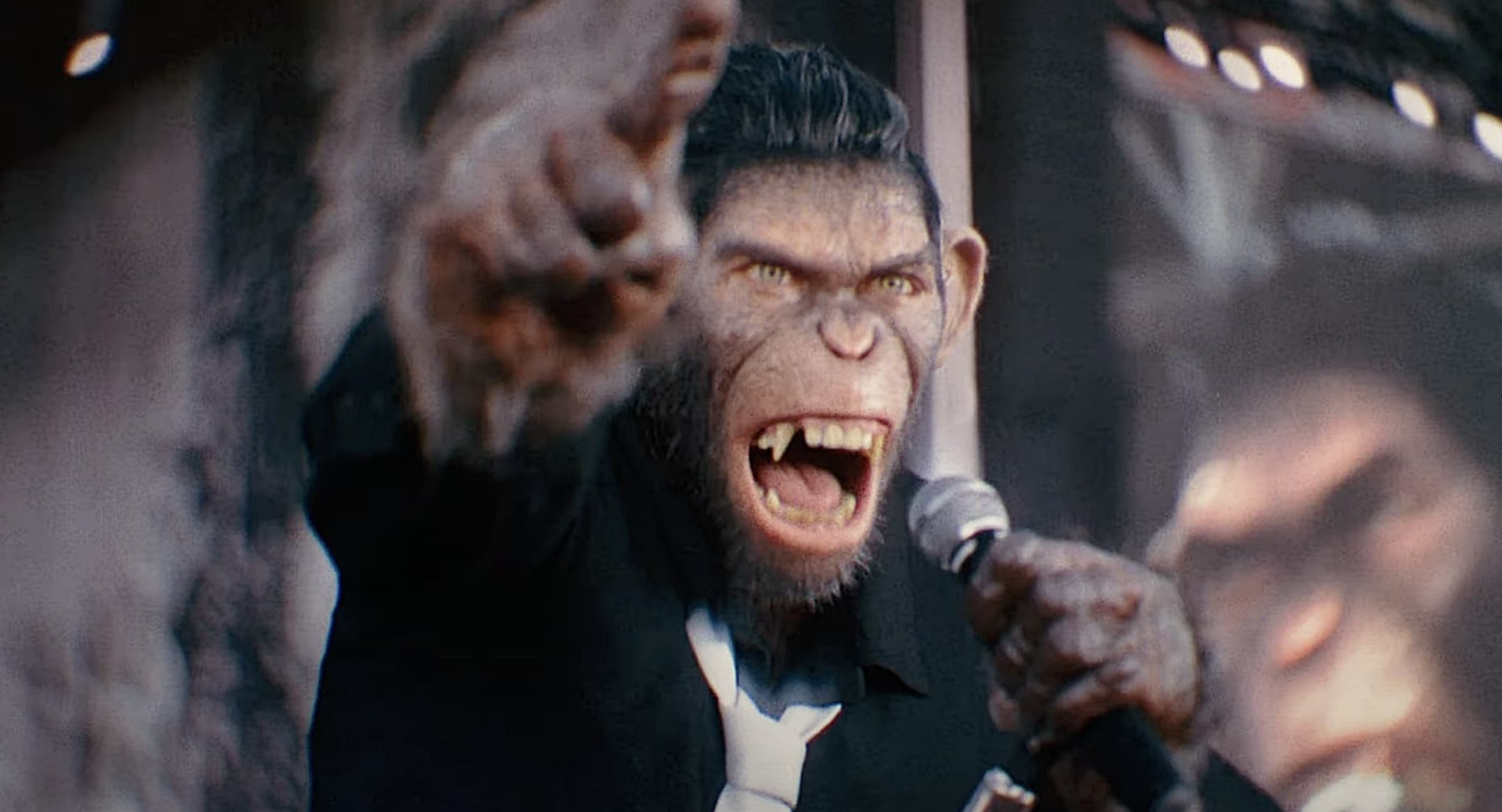Better Man – Film Review
Published February 12, 2025

Michael Gracey’s Better Man is a daring, visually audacious, and deeply unconventional biopic that chronicles the life and career of British pop sensation Robbie Williams. Opting for an unorthodox approach, the film reimagines Williams as an anthropomorphic chimpanzee, a creative decision that is both baffling and brilliant in equal measure. This unique storytelling device serves as a metaphor for Williams’ self-perception—his struggle with feelings of inadequacy and alienation in an industry that often feels brutally unforgiving. Featuring motion capture performance by Jonno Davies and the voice of Williams himself, the film delivers a dazzling blend of musical spectacle and emotional introspection. However, while its ambition is undeniable, Better Man occasionally stumbles under the weight of its own eccentricities.
Better Man immediately distinguishes itself from traditional biopics with its audacious visual concept. Rather than merely dramatizing Williams’ life, the film presents him as a CGI-rendered chimpanzee, a choice that proves surprisingly effective. While the rest of the world treats him as any other human, his simian form externalizes his feelings of being “less evolved” than those around him. This surreal framing device could have easily become gimmicky, but thanks to Jonno Davies’ motion-capture performance and Williams’ own vocal narration, it lends the film an unexpected emotional weight.
Director Michael Gracey, known for his vibrant visual style in The Greatest Showman, brings his flair for spectacle to Better Man. The musical sequences are electrifying, blending live-action performances with dazzling digital choreography. From the neon-soaked euphoria of Rock DJ to the haunting self-destruction of Come Undone, each number is a meticulously crafted set piece that heightens the emotional stakes of Williams’ tumultuous career.
The film follows a familiar rise-fall-redemption arc but injects it with surreal flourishes that elevate the storytelling. Williams’ early struggles in Stoke-on-Trent are poignantly rendered, with Steve Pemberton delivering a formidable performance as his complex, often distant father. Robbie’s initial foray into fame with Take That is captured with both nostalgia and an underlying tension, as his rebellious nature clashes with the rigid boy-band structure imposed by their manager, Nigel Martin-Smith. The film does not shy away from Williams’ self-destructive tendencies—his battles with addiction, his strained relationships, and his frequent bouts of self-doubt form the emotional backbone of the narrative.
However, Better Man truly soars in its depiction of Williams’ solo career. The film masterfully captures the excitement and chaos of his reinvention as a larger-than-life entertainer, illustrating both the euphoric highs and crushing lows of his journey. The Knebworth Festival sequence, one of the film’s most visually striking moments, encapsulates his inner turmoil as he grapples with the pressure of performing before 125,000 fans. It’s a breathtaking spectacle, yet it also underscores his mental health struggles in a way that feels raw and authentic.
While Better Man deserves praise for its ambition, the film is not without its flaws. The decision to present Williams as a chimpanzee, while thematically resonant, occasionally distracts from the emotional depth of certain scenes. Some moments that should feel deeply personal instead carry an unintended surreal detachment, making it harder for audiences to fully invest in Williams’ journey. The film also occasionally struggles with tonal balance—its whimsical elements sometimes clash with the raw, introspective moments, creating an uneven viewing experience.
Additionally, while the film does an excellent job of highlighting Williams’ career and personal struggles, it occasionally glosses over key relationships in his life. His dynamic with Take That, particularly with Gary Barlow, feels underdeveloped, as does his romantic entanglement with Nicole Appleton. These aspects, while present, could have benefited from deeper exploration to add further nuance to Williams’ story.
Despite its unconventional approach, Better Man is anchored by strong performances. Jonno Davies delivers an impressive motion-capture portrayal, capturing Williams’ signature swagger and vulnerability with remarkable precision. His physicality, combined with Williams’ voice work, creates a striking hybrid performance that is both charismatic and deeply human.
Steve Pemberton is a standout as Peter Williams, bringing both warmth and frustration to his portrayal of Robbie’s father. Alison Steadman shines as Betty Williams, infusing the role with warmth and wisdom that serves as an emotional anchor for the story. Kate Mulvany delivers a strong performance as Robbie’s mother, Janet, though she is somewhat underutilized in the narrative.
Unsurprisingly, the film’s soundtrack is one of its greatest strengths. Williams’ hits are seamlessly woven into the narrative, functioning as both musical performances and emotional reflections of his inner turmoil. Songs like Feel, Angels, and Let Me Entertain You are given fresh cinematic interpretations that breathe new life into familiar anthems. The musical numbers not only showcase Williams’ discography but also serve as visual metaphors for his struggles and triumphs. The finale, a heartfelt rendition of My Way, brings the film to a satisfying conclusion, offering a moment of catharsis and closure.
Better Man is an ambitious, visually striking, and emotionally charged film that takes significant creative risks. Its use of CGI to depict Williams as an anthropomorphic chimpanzee is a bold narrative choice that, while occasionally distracting, ultimately enhances the film’s exploration of self-worth and identity. The musical sequences are dazzling, the performances are compelling, and the story is an engaging, if somewhat uneven, tribute to one of Britain’s most enduring pop icons.
While it may not be for everyone, Better Man is a refreshing departure from the standard biopic formula. It embraces spectacle while delivering moments of genuine emotional resonance, resulting in a film that is as unique and unpredictable as Robbie Williams himself. Though it doesn’t always stick the landing, it swings high enough to make the journey worthwhile.
